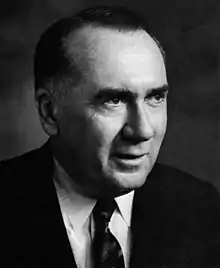Cal Rampton
Calvin Lewellyn "Cal" Rampton (November 6, 1913 – September 16, 2007) was the 11th Governor of the state of Utah from 1965 to 1977.
Cal Rampton | |
|---|---|
 | |
| 11th Governor of Utah | |
| In office January 4, 1965 – January 3, 1977 | |
| Lieutenant | Clyde L. Miller |
| Preceded by | George Clyde |
| Succeeded by | Scott Matheson |
| Chair of the National Governors Association | |
| In office June 2, 1974 – June 8, 1975 | |
| Preceded by | Daniel J. Evans |
| Succeeded by | Robert D. Ray |
| Personal details | |
| Born | Calvin Lewellyn Rampton November 6, 1913 Bountiful, Utah, U.S. |
| Died | September 16, 2007 (aged 93) Holladay, Utah, U.S. |
| Resting place | Salt Lake City Cemetery |
| Nationality | American |
| Political party | Democratic |
| Spouse(s) | Lucybeth Cardon |
| Children | 4 |
| Education | University of Utah (BA) George Washington University (LLB) |
He was born to Llewellyn Smith Rampton and Janet Campbell.[1] His father was of English and Manx ancestry and his mother of Scottish and English descent.[2]
Following his graduation from Davis High School in 1931, Rampton took over his family's automobile business, due to his father's death that same year. He sold the business in 1933 and entered the University of Utah, graduating in 1936. Rampton served as Davis County Attorney from 1938-1940, the only other public office he would be elected to until becoming governor in 1965. Rampton married Lucybeth Cardon (1914–2004) on March 10, 1940; they had four children. He also studied at The George Washington University Law School while working as administrative assistant to Congressman J. W. Robinson.[3]
Rampton served in Europe during World War II as Chief of the Army Claims Commission in Paris; he attained the rank of major and received the Bronze Star Medal. Rampton continued to serve in the Army Reserve and attained the rank of colonel before retiring. After the war he pursued a career as an attorney and his success in civil trial practice earned him a fellowship with the International Academy of Trial Lawyers. He was a Democratic candidate for the Utah State Senate in 1954 and United States Senate in 1962.
He is the only governor of Utah to serve three full consecutive terms,[3] and was one of the most popular governors in the state. During his governorship, he successfully advocated for increased education spending, civil rights legislation, and allocating federal funds for urban renewal. He was a supporter of the Equal Rights Amendment to the U.S. Constitution, and advocated successfully for state construction projects, including Salt Lake City’s Symphony Hall (now Abravanel Hall) and the Salt Lake Arts Center (now Utah Museum of Contemporary Art).
After leaving office, Rampton practiced law until he retired at the age of 75. In 2007, Rampton died of cancer in Holladay, Utah. Shortly after his death, the Salt Palace Convention Center in Salt Lake City was also named in his honor. The Calvin L. Rampton Complex in Taylorsville, which houses the Utah Department of Transportation and the Utah Department of Public Safety, is also named in his honor.
Sources
References
| Party political offices | ||
|---|---|---|
| Preceded by William Barlocker |
Democratic nominee for Governor of Utah 1964, 1968, 1972 |
Succeeded by Scott Matheson |
| Political offices | ||
| Preceded by George Clyde |
Governor of Utah 1965–1977 |
Succeeded by Scott Matheson |
| Preceded by Daniel J. Evans |
Chair of the National Governors Association 1974–1975 |
Succeeded by Robert D. Ray |
.svg.png.webp)